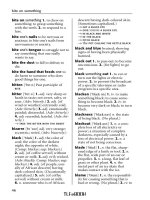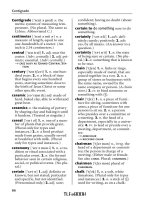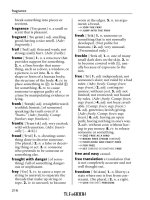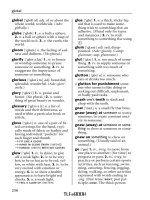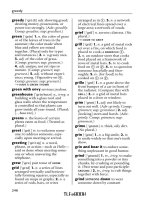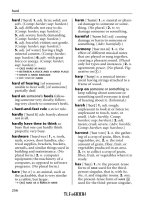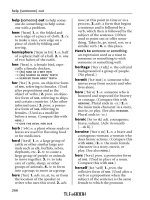NTC''''s Pocket Dictionary of Words and Phrases part 67 pot
Bạn đang xem bản rút gọn của tài liệu. Xem và tải ngay bản đầy đủ của tài liệu tại đây (250.73 KB, 10 trang )
showing poor taste R; offensive;
rude. (Adv: tastelessly.)
tasty ["tes ti] adj. full of flavor;
delicious. (Adv: tastily. Comp:
tastier; sup: tastiest.)
tatter ["tAt #] tv. to tear a piece of
cloth; to fray something.
→
in tatters
taught ["tOt] past tense and past
participle of
teach.
taunt ["tOnt] 1. tv. to tease some-
one; to make fun of someone; to
ridicule someone; to provoke
someone by saying something
unkind.
2. n. an unkind remark
that is made to tease or ridicule
someone.
taut ["tOt] adj. pulled tight; having
no slack; stretched. (Adv: tautly.
Comp: tauter; sup: tautest.)
→
run a taut ship
tax ["tAks] 1. n. money charged by
a government to pay for the cost of
the government and its services.
2. tv. to make someone pay Q.
3. tv. to charge Q on something;
to burden something with Q.
4. tv. to burden someone or some-
thing; to place a strain on some-
one or something. (Figurative on
E.)
→
income tax
tax bracket ["tAks brAk @t] n. one
of a series of federal income-tax
rates and the levels of income
associated with that rate.
tax return ["tAks rI t#n] n. a form,
filled out by someone required to
pay taxes, showing the amount of
tax that is owed.
taxi ["tAk si] 1. n. a cab, a taxicab.
(Short for
taxicab.) 2. iv. [for an
airplane] to move on the ground.
taxicab ["tAk si kAb] n. a car that,
along with its driver, can be hired
for short trips. (Can be shortened
to
taxi or cab.)
tea ["ti] 1. n. the leaves of a bush
grown in Asia that are dried and
then soaked in boiling water to
make a refreshing drink. (Plural
only for types and instances.)
2. n.
a drink made from Q. (No plu-
ral.)
3. n. a drink, like W, made by
soaking dried herbs or other
plants in boiling water. (No plu-
ral.)
→
not
someone’s
cup of tea
teach ["titS] 1. tv., irreg. to provide
instruction in a particular subject.
(Past tense and past participle:
taught.) 2. tv., irreg. to instruct
someone in how to do something.
3. iv., irreg. to work as a teacher.
teach
one’s
grandmother to suck
eggs to try to tell or show some-
one more knowledgeable or expe-
rienced than oneself how to do
something.
teacher ["titS #] n. someone who
teaches people something; some-
one who instructs people in a sub-
ject.
→
be the teacher’s pet
team ["tim] 1. n. a group of players
who form one side in a game or
sport.
2. n. a group of people who
work together.
3. n. two or more
animals that work together to pull
a vehicle or piece of farming
equipment.
team up against
someone or
something
to join with someone
tasty
626
09 7/23/03 8:50 AM Page 626
TLFeBOOK
else against someone or some-
thing.
team up (with
someone
) to join
with one or more persons; to col-
laborate with two or more per-
sons.
teammate ["tim met] n. a member
of a team that one is a part of;
another person on one’s team.
teamwork ["tim w#k] n. the action
of working together as a team.
(No plural.)
teapot ["ti pat] n. a container with
a handle and a spout, used to hold
and pour tea.
→ a
tempest in a teapot
tear 1. ["tIr] n. a drop of liquid that
falls from one’s eye when one
cries.
2. ["tEr] n. a rip; a place in a
piece of cloth or paper that is
ripped.
3. ["tEr] tv., irreg. to make
a hole or a rip in something, espe-
cially by pulling it; to pull some-
thing into pieces. (Past tense:
tore;
past participle: torn.) 4. ["tEr] iv.,
irreg. to be ripped apart.
5. ["tEr]
iv., irreg. to move somewhere very
quickly.
6. ["tIr] iv. to cry; to begin
to cry; to have tears form in one’s
eyes. (Past tense and past partici-
ple: teared [
"tird].)
→
blink back
one’s
tears
→ break out in tears
→ break (out) into tears
→ shed crocodile tears
tear away (from
someone or
something
) to leave someone or
something, running or moving
very fast.
tear down
something
to race down
something very fast.
tear off (from
someone or some-
thing
) to leave someone or some-
thing in a great hurry.
tear
one’s
hair (out) to be anxious,
frustrated, or angry.
tear (
oneself
) away (from
some-
one or something
) to force oneself
to leave someone or something.
tear out (of
someplace
) to leave a
place in a great hurry.
tear
someone or something
down
to criticize someone or something
without mercy.
tear
someone
up to cause someone
to grieve greatly.
tear
something
away (from
some-
one or something
) 1. to peel some-
thing from someone or some-
thing.
2. to snatch something
away from someone or something.
tear
something
down to raze or
demolish something; to destroy
something such as a building.
tear
something
off ((of)
someone
or something
) to peel or rip some-
thing off someone or something.
tear
something
out (of
something
)
to remove something from some-
thing by ripping or tearing.
teardrop ["tIr drap] n. one tear;
one drop of liquid that falls from
one’s eye.
tease ["tiz] 1. tv. to taunt someone;
to make fun of someone.
2. tv. to
flirt with someone, especially with
sexual hints.
3. tv. to separate
strands of hair; to comb strands of
hair apart.
4. iv. to taunt [someone
or something]; to annoy on pur-
pose.
5. n. someone who flirts
with someone else as in W.
tease
627
09 7/23/03 8:50 AM Page 627
TLFeBOOK
technician [tEk "nI S@n] n. some-
one who works in the field of
industrial or mechanical sciences;
someone who works in a labora-
tory, performing tests.
technique [tEk "nik] 1. n. a special
method of doing something.
2. n.
the skill involved in creating or
performing art; the way that art is
performed, displayed, or exhib-
ited—showing the artist’s skill.
(No plural.)
technology [tEk "nal @ dZi] n. the
science and study of the mechani-
cal and industrial sciences. (Plural
only for types and instances.)
teen ["tin] 1. n. a teenager. 2. the
adj. use of Q.
teenage ["tin edZ] adj. of, for, or
about teenagers; of the ages from
13 through 19.
teenager ["tin edZ #] n. someone
whose age is between 13 and 19.
teens n. the numbers 13–19 or
10–19. (When referring to age, it
refers to the period of someone’s
life from the age of 13 through the
age of 19.)
teeth ["tiT] plural of tooth.
→
armed to the teeth
→ (as) scarce as hens’ teeth
→ by the skin of
one’s
teeth
→ fly in the teeth of
someone or
something
→ get
one’s
teeth into
something
→ gnash
one’s
teeth
→ grit
one’s
teeth
→ lie through
one’s
teeth
→ no skin off
someone’s
teeth
→ pull
someone’s or something’s
teeth
→ put some teeth into
something
→ scarcer than hens’ teeth
→ set
someone’s
teeth on edge
→ sink
one’s
teeth into
something
teething troubles
1.
a baby’s dif-
ficulties and pain experienced
during the growth of its first set of
teeth.
2. difficulties and problems
experienced in the early stages of a
project, activity, etc.
telegram ["tEl @ grAm] n. a mes-
sage sent by telegraph.
telegraph ["tEl @ grAf] 1. n. a
machine that sends messages in
electrical code over electrical
wires.
2. tv. to send a message by
using Q. (E.g., telegraphed his
response.)
3. tv. to send [a mes-
sage] to someone by Q. (E.g., tele-
graphed John with his response.)
telephone ["tEl @ fon] 1. n. a device
that transmits sound by convert-
ing it into electrical signals; a
phone. 2. tv. to call someone by
using Q.
3. iv. to make a call with
Q.
→
cell(ular) telephone
telephone call ["tEl @ fon "kOl] n. a
message or a conversation using
the telephone; an instance of
someone contacting someone by
telephone. (Can be shortened to
call or phone call.)
telescope ["tEl @ skop] 1. n. a
device that makes distant objects,
especially objects that are in the
sky, look larger so that one can see
them better.
2. iv. to become
shorter or longer by having one
part slide over another as with Q.
3. tv. to make something shorter
or longer by sliding one part of it
over another.
television ["tel @ vIZ @n] 1. n. the
transmission of an electronic sig-
nal containing sounds and images.
(No plural. Can be shortened to
technician
628
09 7/23/03 8:50 AM Page 628
TLFeBOOK
TV.) 2. n. the business of produc-
ing Q or the programs that are
transmitted on Q. (No plural.
Can be shortened to
TV.) 3. n. an
electronic device that converts
electronic signals into sounds and
images. (Short for
television set.)
4. the adj. use of Q, W, or E.
television set ["Tel @ vIZ @n "sEt] n.
an electronic device that turns a
television signal into images and
sound. (Can be shortened to
tele-
vision
or TV.)
tell ["tEl] 1. tv., irreg. to express
something in words. (Past tense
and past participle:
told.) 2. tv.,
irreg. to inform someone [of
something].
3. tv., irreg. to signal
information [to someone].
4. tv.,
irreg. to reveal a secret.
5. iv., irreg.
to reveal [a secret].
6. iv., irreg. to
try to make trouble for a person by
saying (to an authority) what that
person has done.
→
not tell a soul
tell its own story and tell its
own tale [for the state of some-
thing] to indicate clearly what has
happened.
tell its own tale Go to tell its own
story.
tell
one
to
one’s
face to tell (some-
thing) to someone directly.
tell
someone
where to get off to
rebuke someone; to put one in
one’s place.
tell tales out of school to tell
secrets or spread rumors.
teller ["tEl #] n. someone who
works at a bank, receiving and giv-
ing out money.
temper ["tEm p#] 1. n. mood; the
condition of one’s mind, especially
in regard to anger. (No plural.)
2. n. an angry mood; the potential
of being angry. (No plural.)
3. tv.
to soften something; to lessen the
force or impact of something; to
make something more moderate.
→
hold
one’s
temper
→ keep
one’s
temper
→ lose
one’s
temper
temper tantrum ["tEm p# "tAn
tr@m
] n. a burst of anger; a display
of temper like that of a child. (Can
be shortened to
tantrum.)
temperature ["tEm p# @ tS#] 1. n.
the degree of how cold or hot
something is.
2. n. the degree of
the heat of one’s blood, especially
when it is above average; a fever.
→
run a temperature
tempest ["tEmp @st] n. a violent
storm.
a
tempest in a teapot an uproar
about practically nothing.
temple ["tEm p@l] 1. n. a building
used for worship and ceremonies.
2. n. a Jewish house of worship.
3. n. the flat part on the side of the
head between the eye and the ear
and above the cheekbone.
temporary ["tEm p@ rEr i] adj. for a
limited time; not permanent.
(Adv: temporarily [
tEm p@ "rEr @
li
].)
tempt ["tEmpt] tv. to arouse some-
one’s desire; to make someone
want something.
temptation [tEmp "te S@n] 1. n.
desire; an instance of being
tempted. (No plural.)
2. n. some-
one or something that tempts a
person.
temptation
629
09 7/23/03 8:50 AM Page 629
TLFeBOOK
tempted (to
do something
) ["tEmp
tId
] wanting to do something,
especially something that one
should not do.
ten ["tEn] 1. 10. Go to four. 2. n. a
$10 bill.
tend ["tEnd] tv. to take care of
something.
tend to
do something
to be likely to
do something; to be inclined to do
something.
tend to
someone or something
to
mind someone or something; to
take care of someone or some-
thing.
tendency ["tEn d@n si] n. the likeli-
hood that someone or something
will do something naturally.
tender ["tEn d#] 1. adj. soft; not
tough; easy to chew. (Adv: ten-
derly.)
2. adj. sore; sore when
touched; painful. (Adv: tenderly.)
3. adj. kind; gentle; showing love
or affection. (Adv: tenderly.)
4. tv.
to offer something formally or
legally, such as to offer money in
payment of a debt.
→
legal tender
tennis ["tEn Is] n. a sport played by
two people or two pairs of people
who use rackets to hit a small ball
from one side of the playing area,
over a net, to the other side of the
playing area. (No plural.)
tense ["tEns] 1. adj. taut; not loose;
not relaxed. (Adv: tensely. Comp:
tenser; sup: tensest.)
2. adj. nerv-
ous; not relaxed. (Adv: tensely.
Comp: tenser; sup: tensest.)
3. tv.
to tighten something, such as a
muscle; to stiffen something; to
make something taut.
4. n. a qual-
ity of a verb that indicates the time
that the action or state it expresses
takes place.
→
past tense
→ present tense
tense up (for
something
) to
become rigid or firm; to become
anxious and ready for something.
(Both literal and figurative uses.)
tension ["tEn S@n] 1. n. the degree
of tightness of something that is
stretched. (Plural only for types
and instances.)
2. n. an anxious or
nervous feeling; hidden anxiety or
anger.
tent ["tEnt] n. a temporary shelter
made of fabric supported by poles
and ropes.
→
pitch a tent
tenth ["tEntT] 10th. Go to fourth.
term ["t#m] 1. n. the length of time
that something lasts; a particular
period of time.
2. n. a division of a
school year; a quarter or semester.
3. n. an expression used in a par-
ticular field; a word.
→
come to terms with
someone or
something
→ a contradiction in terms
→ in terms of
something
terminal ["t# m@ n@l] 1. adj. hap-
pening at the end of something; at
the end; last. (Adv: terminally.)
2. adj. resulting in death; causing
death; not able to be cured. (Adv:
terminally.)
3. n. a building that
passengers enter and leave from,
especially at an airport, bus sta-
tion, or train station.
4. n. some-
thing that makes an electrical
connection; the place where cur-
rent enters or leaves a battery or a
circuit.
5. n. a computer device
consisting of a keyboard and a
tempted (to do something)
630
09 7/23/03 8:50 AM Page 630
TLFeBOOK
screen that displays the informa-
tion sent to and from a computer.
termite ["t# maIt] n. an insect,
similar to an ant, that eats wood,
causing great damage to wooden
objects and structures.
terms 1. n. requirements; details;
provisions.
2. n. charges; fees and
requirements.
terrace ["tEr @s] 1. n. a flat area
connected to or next to the side of
a house or apartment; a balcony or
patio.
2. n. a flat area of land that
has been cut into the side of a hill
or mountain.
terrain [t@ "ren] n. the physical fea-
tures of an area of land.
terrible ["tEr @ b@l] adj. awful; hor-
rible; extremely bad. (Adv: terri-
bly.)
terribly ["tEr @ bli] 1. adv. badly;
horribly; awfully.
2. adv. very;
extremely.
terrier ["tEr i #] n. one of a group of
breeds of small dogs, originally
bred to be used in hunting.
terrific [t@ "rIf Ik] 1. adj. great;
wonderful; super; excellent. (Adv:
terrifically [
Ik li].) 2. adj.
extreme[ly bad]. (Adv: terrifically
[
Ik li].)
terrify ["tEr @ faI] tv. to scare some-
one or something greatly.
territory ["tEr @ tor i] 1. n. land;
area. (No plural.)
2. n. an area of
land controlled by a specific gov-
ernment, especially a government
that is far away.
3. n. an area of
land that is dominated by an ani-
mal or group of animals.
terror ["tEr #] 1. n. extreme fear.
(Plural only for types and
instances.)
2. n. someone or some-
thing that causes extreme fear.
terrorism ["tEr # Iz @m] n. the use
of violence and terror to achieve
political goals. (No plural.)
terrorist ["tEr # Ist] n. someone
who practices terrorism.
test ["tEst] 1. n. a series of ques-
tions or activities that determine
someone’s knowledge or skill; a
school examination.
2. n. an
experiment; an action that is done
to see how something works.
3. tv.
to determine someone’s knowl-
edge or skill by evaluating answers
to questions or performance of
activities.
4. tv. to subject some-
thing to W in order to measure its
condition or see how it works.
→ the
acid test
→ litmus test
→ put
someone
to the test
test out (of
something
) to score
high enough on a special test that
one does not need to take a partic-
ular school course.
test
something
out to try some-
thing out; to test something to see
if it works.
testimony ["tEs t@ mo ni] n. the
statements of a witness, especially
in a court of law. (Not usually plu-
ral. Treated as singular.)
text ["tEkst] 1. n. the main words in
a book or article, not the pictures,
tables, graphs, indexes, etc. (No
plural.)
2. n. the words of a speech
in written form.
3. n. a book used
by students in school or college.
(Short for
textbook.)
textbook ["tEkst bUk] 1. n. a book,
designed for student use, that is
used as a standard source of infor-
textbook
631
09 7/23/03 8:50 AM Page 631
TLFeBOOK
mation about a specific subject.
(Can be shortened to
text.) 2. adj.
[of possible examples] the best
and most typical.
texture ["tEks tS#] 1. n. the even-
ness or smoothness—or uneven-
ness or roughness—of something.
2. n. the appearance of having Q,
such as with a design on paper or
in art.
than ["DAn] conj. as compared with
someone or something; in com-
parison with someone or some-
thing. (Used before the second
item of a comparison.)
thank ["TANk] tv. to show someone
gratitude by saying “thank you”;
to express gratitude for something
that has been given or done.
thank
one’s
lucky stars to be
thankful for one’s luck.
Thank you.
1.
interj. a polite
expression that is used by the
receiver of an action or gift, along
with “yes” or “no” in response to a
question, or to show gratitude.
2. n. an expression of gratitude.
(See also
thanks.) 3. the adj. use of
Q. (Hyphenated.)
thankful ["TANk fUl] adj. grateful;
showing thanks; expressing
thanks. (Adv: thankfully.)
thankful for small blessings
grateful for any benefits or advan-
tages one has, especially in a gen-
erally difficult situation.
thanks 1. interj. a polite expression
that is used by the receiver of an
action or gift, along with “yes” or
“no” in response to a question, or
to show gratitude. (Less formal
than
Thank you.) 2. n. gratitude.
(Treated as plural, but not counta-
ble.)
→ a
vote of thanks
Thanksgiving [TANks "gIv IN] n. a
holiday celebrated in the United
States and Canada as an expres-
sion of individual and national
gratitude. (
Thanksgiving is held on
the fourth Thursday in November
in the United States.)
that ["DAt] 1. adj. a form referring
to someone or something already
mentioned or someone or some-
thing of which both the speaker
and hearer are aware. (Prenominal
only. With plural nouns, use
those.) 2. adj. a form referring to
someone or something further
away or the furthest away from the
speaker. (Used in contrast with
this. Prenominal only. With plural
nouns, use
those.) 3. pron. a form
standing for someone or some-
thing already referred to or some-
one or something of which both
the speaker and hearer are aware.
(Plural:
those.) 4. pron. a form
standing for someone or some-
thing that is further away or the
furthest away from the speaker.
(Used in contrast with
this. Plural:
those.) 5. pron. which. (Used to
connect sentences, clauses, and
phrases with noun phrases. Only
used with restrictive clauses. See
which for an explanation. Some-
times means “when” or “where” if
it follows a noun phrase referring
to a time or place.)
6. pron. who;
whom. (Used to connect sen-
tences, phrases, or clauses with
noun phrases. Only where
who or
whom would be appropriate.)
7. pron. a form used to connect a
texture
632
09 7/23/03 8:50 AM Page 632
TLFeBOOK
verb with a clause that is the object
of the verb. (Only certain verbs
use
that in this way. This that can
be omitted.)
8. adv. so; to such a
degree. (E.g., [gesturing] he is that
big.)
That takes care of that. That is
settled.
that’s ["DAts] 1. cont. that is.
2. cont. that has, where has is an
auxiliary.
That’s the last straw. and That’s
the straw that broke the
camel’s back. That is the final
difficulty or problem that makes
the burden too great or that makes
the task too difficult, because
many problems or difficulties have
already preceded it.
That’s the straw that broke the
camel’s back.
Go to That’s the
last straw.
That’s the ticket. That is exactly
what is needed.
thaw ["TO] 1. iv. [for ice] to melt;
[for something frozen] to no
longer be frozen; [for the weather]
to be warm enough to melt ice or
snow.
2. iv. to become less formal;
to relax. (Figurative on Q.)
3. tv.
to melt something; to cause some-
thing to no longer be frozen.
4. n.
a condition in which the weather
has become warm enough to melt
ice or snow.
thaw out to warm up after being
frozen.
thaw
someone or something
out to
raise the temperature of someone
or something above freezing.
the [D@, Di] 1. article a certain one;
certain ones. (The definite article.
Used before nouns or noun
phrases to show that a definite
thing, person, or group of people
or things is being referred to. Pro-
nounced [
"Di] when emphasized or
before vowel sounds.)
2. article a
form showing a general category.
(Used before a noun that is used in
a general sense.)
3. article a form
indicating the special or specific
one, the one that is being talked
about. (Used before some names
and titles.)
theater and theatre ["Ti @ t#]
1. n. a building where movies are
shown or where plays are per-
formed. (The spelling theatre is
used especially for buildings where
plays are performed, and much
less often for buildings where
movies are shown.)
2. n. the busi-
ness of producing plays for the
stage; the study of drama, perfor-
mance, and acting. (No plural.)
theft ["TEft] n. stealing; taking
someone else’s property without
permission. (Plural only for types
and instances.)
their ["DE#] 1. pron. the possessive
form of
they; belonging to people,
animals, or things that have
already been mentioned. (Used
only as a modifier before a noun.)
2. pron. Q standing for his E;
belonging to a person who has
already been mentioned. (Used to
refer to a preceding noun or pro-
noun, the sexual reference of
which is unimportant, indetermi-
nate, undetermined, or irrelevant.
Adopted as a replacement for
his
E by those who see his E as
referring to males only. Objected
their
633
09 7/23/03 8:50 AM Page 633
TLFeBOOK
to by some as an unnecessary vio-
lation of grammatical number
when used for singular nouns.)
theirs pron. the possessive form of
they; belonging to people, animals,
or things that have already been
mentioned.
them ["DEm] 1. pron. the objective
form of
they. (Used to refer to
people, animals, and things. Used
after prepositions and as the
object of verbs.)
2. pron. a form
standing for
him W, referring to a
person already mentioned. (Used
to refer to a noun or pronoun, the
sexual reference of which is unim-
portant, indeterminate, undeter-
mined, or irrelevant. Adopted as a
replacement for
him W by those
who see
him W as referring to
males only. Objected to by some as
an unnecessary violation of gram-
matical number when used for
singular nouns.)
theme ["Tim] 1. n. a subject of a
speech or a text; a topic.
2. n. a
melody that is used to identify a
certain program, movie, charac-
ter, or emotion.
3. n. the main
melody of a piece of music.
4. n. a
visual or decorative concept that
connects several parts of some-
thing.
5. adj. of or about a piece of
music that is readily identified
with someone or something.
themselves [DEm "sElvz] 1. pron.
the reflexive form of
they, used
after a verb or a preposition when
the subject of the sentence refers
to the same people, animals, or
things that the pronoun refers to.
2. pron. the reflexive form of they
used after they or a plural noun
phrase as an intensifier.
→
by themselves
→ speak for themselves
then ["DEn] 1. adv. at that time.
2. adv. next; following; after that.
3. adv. therefore; in that case; so.
theology [Ti "al @ dZi] n. the study
and science of religion. (Plural
only for types and instances.)
theory ["TIr i] n. knowledge of a
science or an art, as opposed to
the actual practice of a science or
an art; the principles on which a
science or an art are based. (Plural
only for types and instances.)
→
in theory
there ["DE#] 1. adv. to or toward
that place; at that place; in that
place; in that respect; at that point
in time; at that point during a pro-
cess. (Compare this with
they’re
and their.) 2. adv. a form that
begins a sentence or clause and is
followed by a verb, which is then
followed by the subject of the sen-
tence. (The verb is usually
be—for
example, there is, there are—but it
can also be go, come, stand, rest, or
another verb. In questions, the
verb is placed before there.)
3. pron. a particular place or
location.
There are plenty of other fish in
the sea.
There are many other
choices, especially regarding the
choice of a mate or a date.
There will be the devil to pay.
There will be lots of trouble.
there’s ["DE#z] 1. cont. there has,
where
has is an auxiliary. 2. cont.
there is.
theirs
634
09 7/23/03 8:50 AM Page 634
TLFeBOOK
thermometer [T# "mam @ t#] n. a
device that measures the tempera-
ture of someone or something.
these ["Diz] plural of this.
they ["De] 1. pron. the third-person
plural subject pronoun; the plural
of
he, she, or it. 2. pron. the third-
person plural subject pronoun
used as a singular. (Used to refer
to a preceding noun or pronoun,
the sexual reference of which is
unimportant, indeterminate,
undetermined, or irrelevant.
Adopted as a replacement for
he
W by those who see he W as refer-
ring to males only. Objected to by
some as an unnecessary violation
of grammatical number when
used for singular nouns.)
3. pron.
people in general; a group of peo-
ple.
they’d ["Ded] 1. cont. they would.
2. cont. they had, where had is an
auxiliary.
they’ll ["Del] cont. they will.
they’re ["DE#] cont. they are.
(Compare this with
there, their.)
they’ve ["Dev] cont. they have,
where
have is an auxiliary.
thick ["TIk] 1. adj. not thin; having
a greater than average distance
between two opposite sides; hav-
ing a lot of space between two
opposite sides. (E.g., a thick board.
Adv: thickly. Comp: thicker; sup:
thickest.)
2. adj. measuring a cer-
tain distance between two oppo-
site sides; having a certain depth
or width. (E.g., two feet thick.
Comp: thicker. No superlative.)
3. adj. dense; with very little space
between things. (Adv: thickly.
Comp: thicker; sup: thickest.)
4. adj. not pouring easily, like glue
or molasses; being liquid but not
flowing easily. (Adv: thickly.
Comp: thicker; sup: thickest.)
5. adj. [of air] not clear; [of air]
full of water vapor, smoke, or fog.
(Comp: thicker; sup: thickest.)
6. adj. [of an accent or manner of
speaking] showing where the
speaker is from.
→
(as) thick as pea soup
→ (as) thick as thieves
→ get
something
into
someone’s
thick
head
→ get
something
through
someone’s
thick skull
→ lay it on thick
→ pour it on thick
→ spread it on thick
→ through thick and thin
thick and fast in large numbers or
amounts and at a rapid rate.
thicken ["TIk @n] 1. tv. to cause
something to become thicker.
2. iv. [for a liquid] to become
thicker.
→ The
plot thickens.
thick-skinned not easily upset or
hurt; insensitive to offense.
thief ["Tif] n., irreg. someone who
steals things. (Plural:
thieves.)
thieves ["Tivz] plural of thief.
→
(as) thick as thieves
thigh ["TaI] n. [in humans and
many animals] the part of the leg
between the hip and the knee.
thin ["TIn] 1. adj. not thick; having
less than the average distance
between two opposite sides; hav-
ing very little space between two
opposite sides. (Adv: thinly. Comp:
thinner; sup: thinnest.)
2. adj. not
fat; slender; slim; not having much
thin
635
09 7/23/03 8:50 AM Page 635
TLFeBOOK

